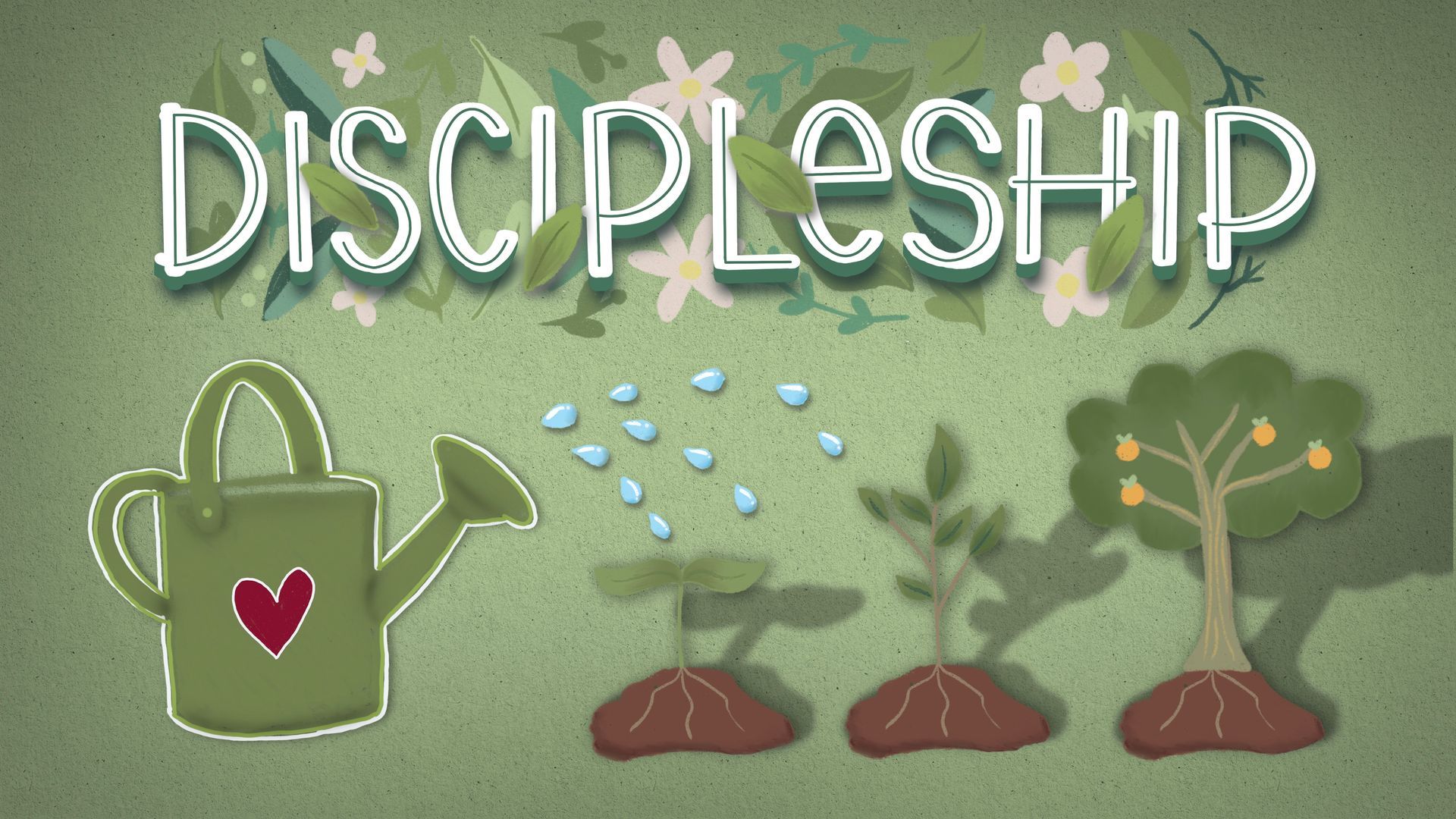
Below you will find an archive of Pathway message series' study guides. If you are looking for audio recordings of messages, please visit our online message archive.
You can use these study guides as supplements for the message series, as discussion topics with a life group, or just as a way to dig deeper into God's word on your own time.
If you have any questions, please feel free to contact us.
Study Guide By Year:
2024
Discipleship
The idea of mentorship and discipleship can be a very daunting concept. Many ministries have formal discipleship programs that may have curriculum, leadership development, while others may encourage informal or organic mentor relationships. At the core of any of these ministries is a more basic principle; discipleship is a core command of God for those who have chosen to identify with Christ as their Lord and Savior. This is not a series on how to develop a ministry of discipleship. Instead, we hope this short series refocuses the heart of believers to seek out mentorship, strive to grow in relationships that encourage their growing faith, and also seek to make disciples around them as they encourage others to grow.
“19 Therefore go and make disciples of all nations, baptizing them in the name of the Father and the Son and the Holy Spirit, 20 teaching them to obey everything I have commanded you. And remember, I am with you always, to the end of the age.” Matthew 28:19-20
The Gospel of John
In a year where our church goal is to create intimate and intentional community, moving people to faith with a focus on God’s glory together, there is no better place to turn than to the Gospel of John. This book was written by the “disciple that Jesus loved,” who walked with Jesus, heard His teachings and witnessed His miracles. The intimacy Jesus had with His Father, allowed those who knew Him to clearly see God. On top of growing a deep connection with the Scripture, we hope that knowing the Word will draw us together in community with an intentional focus on God’s glory in our lives.
The Gospel of John is unique, especially when analyzed next to the synoptic gospels. “About 93 percent of the material in John's Gospel does not appear in the Synoptics.” (Constable’s Commentary) John omitted many things that the other gospels included, like the parables of Jesus, genealogy, temptation, garden of Gethsemane, and more. Instead he included private conversations and intimate moments with Jesus and His disciples. Within this gospel there are also 7 miracles and 7 “I am” statements that demonstrate and teach that Jesus was the divine Messiah.
John wrote, “These [miraculous signs] are recorded so that you may believe that Jesus is the Christ, the Son of God, and that by believing you may have life in his name.” (v.20:31) Our prayer for this series is that everyone would believe that Jesus is the Christ, that they would have an intimacy with God the Father, being led by the Spirit, and find community in fellowship with others as we study the Word together.
2023
Church... It’s Not For Me
This message series was initially inspired by my observation that I was missing many people who used to be regular attenders at this church. I genuinely missed seeing them and getting updated on what was going on in their lives. I missed their presence during worship and afterward during refreshment time and lunch events. I had gotten used to seeing them almost every week, even if it were only for a brief hello and an exchange of smiles. The more I thought about all the people that I was no longer seeing the sadder and more melancholy I became.
This turned into a certain level of frustration and disappointment. I began to ponder why so many people are missing from our church and is there something that we, as a church, or as church leadership, should be doing differently?
Well, I took these feelings as a prompting from the Spirit that this should be a topic to bring to the entire church. Maybe God wants His church to take some time to reflect on this. As I began to dig deeper into what scripture says about God’s Church and what scholars and pastor/authors had to say about this topic I discovered that this phenomenon is not just a Pathway Church issue. There is an exodus occurring within Christian churches in America. Currently there are more people leaving the church than at any other time in U.S. history. As I was preparing and researching for this series, I read a preview for a book that was not yet published called, “The Great Dechurching,” by Jim Davis, and it was singularly dedicated to this topic. I took this as further affirmation that we should fully commit to this topic as the next message series for Pathway church. This series will explore the major reasons given by people who have stopped coming to church on Sundays. We will see how God’s Word applies to the
various situations.
A Heart’s Full Worship
Worship is an essential part of the Christian faith and development but it is often misunderstood. Worship is not merely the time of our Sunday service where we sing together, or the time that we spend sitting in church for our weekly “worship service.”
The full expression of worship is one that encompasses all aspects of life. We give all of ourselves to God when we, “love the Lord your God with all of your heart, soul, mind and strength and to love your neighbor as you love yourself.” That is to say, when we set our thoughts on something, giving our passion and full focus, our bodies and actions will follow. The energy of our heart, soul, mind and strength will show us what we are worshipping.
While we may not have idols set in statues of gold or bronze around our societies, we still find a lot of idols. Work, financial security, possessions, family, status, image, power, presence, etc. can all be things that we think about, focus on passionately, and give most of our energy to. These things become our objects of worship, and these things will always leave our hearts wanting. There is only one object of worship that will ever satisfy what our souls long for.
When we worship God with all that we are, we will not only be satisfied, but we will be refreshed. Imagine pouring yourself out to something (actually, someone) who not only receives your worship but restores you and fills you as you pour yourself out. God restores our mind, saves our souls, challenges and uplifts our hearts, and gives us the strength to make a difference in our world. As our church focuses on being a relevant church, going beyond our walls to impact our community, it is important for us to keep our focus on God, in full worship, not just to give ourselves up to Him, but also to be filled and restored by His presence.
Acts Study Guide
It is important to know your history. When it comes to a family: where did you come from? What is your culture? Why do you do the things you do? When it comes to an organization, you can ask the same questions. Pathway has a distinct culture with established practices and focuses. We love to study God’s word and pour out our hearts in worship. Pathway has always loved breaking bread together to fellowship too. Some other things we do have been around since the beginning of our church and other things have changed with the times and talents of our amazing church body. Pathway’s organizational origins may be documented as starting in 1997, but the core of this church began in the book of Acts.
Taking time to know and remember the start of the early church, how this two thousand year old movement launched, will recenter us on some essential foundations of the church and
also push us forward as we reconnect with our call to be witnesses in our current contexts, their surroundings, beyond our comforts and to the ends of the earth (Acts 1:8). Can we reconnect our modern church to a church that is led by the Holy Spirit, speaks boldly in the face of opposition, sacrificing readily for all who have need, gathering together daily to study the
teachings of Scripture, and going beyond our comforts so that the important and urgent message of the gospel is known?
The Urgency of the Gospel
We often hear about the importance of the gospel, the “good news” of God’s love expressed through Jesus Christ, but we do not often feel the urgency of the gospel. This is not wrong, but it is an incomplete understanding of a vital truth. The gospel is important because it conveys the message of a miracle that would save an imperfect humanity from the consequences of their own sin (Romans 3:23, 6:23, John 3:16-21). For God to do for us what we could not do for ourselves, saving us from eternal separation from an all loving God, means this is the single most important truth for each individual to hear.
The URGENCY of the gospel comes in understanding that our time on earth is very limited but our eternities stretch much longer than we could comprehend. While an individual person’s eternity may be secure if they believe in Jesus, there are others whose time on earth is still limited with their subsequent eternities hanging in the balance. These family, friends, neighbors, coworkers, etc. need this message now.
If the gospel is as important as believers say it is, it should compel Christians to live radically different lives. We should be moved by the gospel to dedicate our lives to growing, living our faith out, forgiving readily because we are fully forgiven, to tell everyone even if it is uncomfortable because it is important and urgent, building connections inside and outside the church and to hope in everything. Our time on earth is too short and God’s call to His children is too important for us to allow anything to take the focus, energy, passion of the church away from the Good News of His amazing love. In John 9:4, Jesus says, “We must perform the deeds of the one who sent me as long as it is daytime. Night is coming when no one can work.”
As we go through this series, we hope to challenge the church to live as if the gospel is life changing and important enough to push through the simple inconveniences, distractions, and deterrents that might sideline a lesser truth. We hope the impression of the true urgency of God’s story would not only penetrate the hearts of those around us, but also impact every second of our existence so that we could be the hands and feet that might deliver the good
news. (Romans 10:14-17)
2022
Seven Letters Study Guide
“Write in a book what you see and send it to the seven churches - to Ephesus, Smyrna, Pergamum, Thyatira, Sardis, Philadelphia, and Laodicea.”
In the book of Revelation, while on the island of Patmos, John has a vision. Most of us will immediately think of some incredible imagery, judgments, tribulation, end times and the final battle when we think about the last book of the Bible. But like many biblical prophecies, there are elements of foretelling the future as well as many elements of forthtelling truth. Foretelling looks to future, unseen events, but forthtelling speaks divine revelation to current issues that
need to be addressed, revealing God’s plan or delivering a message.
John has been commissioned to write seven letters to the seven churches in Asia Minor. These churches are real churches going through specific issues that need to be addressed and are also receiving encouragement for faithfully enduring trials. But we must not read these letters merely as direct encouragements to specific churches at a certain time in history. These letters were meant for all of the churches (Revelation 2:7, 11, 17, 23) and are challenges to individuals, “To those who overcome.” We know that “no temptation has seized you except what is common to man” (1 Corinthians 10:13), so whatever situation the seven churches found themselves in, there was likely another church experiencing something similar: false teachings, false apostles, church leaders abusing power, loss of focus, lack of passionate faith.
The letters contain 7 elements in each letter:
1. A destination church
2. A description of Jesus (Ref Revelation 1:12-20)
3. Commendation
4. Criticism
5. Exhortation
6. Punishment
7. Promise to those that overcome.
Not all letters have all 7 elements as each church is unique in its own situations. "Churches 1 and 7 are in grave danger; churches 2 and 6 are in excellent shape, churches 3, 4, and 5 are middling, neither very good nor very bad." (Morris).
“While two letters contain no unfavorable verdict (Smyrna, Philadelphia) and two no word
of commendation (Sardis, Laodicea), yet since all seven letters would be sent to each church together with the entire Book of Revelation (cf. 1:11), we may assume that Christ intended that all the churches hear words of both commendation and blame.” (Expositor’s Bible Commentary)
“But the Lord was also speaking to individuals, and this is where you and I come in. “He that hath an ear, let him hear.” Churches are made up of individuals, and it is individuals who determine the spiritual life of the assembly. So, while reading these messages, we must apply them personally as we examine our own hearts.” (Wiersbe “Be Series”) While we see seven letters, with seven elements in each letter, for the seven churches to read, we can all be challenged by each letter. Maybe in one letter the criticism resonates in us and in another, we find hope in the promise to those who overcome. As we read it is important to understand the condition and situation of each church, but also how the challenges to them
can be growing moment s for us.
NOTW: Not of this World
● As Christians we are “not of this world,” but how have we arrived at this conclusion and reality? What does that really mean, and how did we get to where we are now? What are the implications, the consequences, and the expectations
as we continue onward?
● During this series, we will be looking through Biblical truths, principles, and tools to navigate through different cultures as well as bringing the message of the Cross as we “cross over” to different cultures.
● Additionally, we will discuss the importance of not burning bridges, but instead, building bridges, bridging the gaps, and pointing others to the ultimate bridge,
Christ.
● Lastly, we will think, pray, and work through our personal levels of convictions, comfortability, and conscience when it comes to different topics and issues.
● There will be four pieces addressing the who, why, what, and how.
1&2 Thessalonians
Take time to read Acts 17:1-15. This gives the context of the church in Thessalonica, where it started, the trouble that it experienced, and why Paul had to write this letter. Paul spoke in the synagogue for three weeks (“on three Sabbath days” Acts 17:2) but he most likely stayed longer than that “in view of what he wrote that he had done there (e.g., 1 Thess 2:9; cf. Phil 4:15-16).” (Constable’s Commentary)
(v.1-5) Paul was there sharing as the Thessalonians turned to faith, but he did not take the credit. Their faith was “in the presence of our God and Father,” and “in power in the Holy Spirit and with deep conviction.” What made their faith so great? Their openness to the gospel and hope of Jesus, in the presence of the Father, in the deep conviction with the Spirit. It is so easy to overlook verses like this with “churchy” phrases, but taking time to realize that their faith is based on a genuine connection with God on multiple levels reminds us to do the same.
(v.6-9) The resounding impact of those who live out genuine faith is incredible. It is not just about how each individual speaks and evangelizes, but the changing of a culture, shaping a community of faith can be a shining example to surrounding areas. Paul imitated Christ and the Thessalonian church imitated Paul. “As a result you became an example to all the believers in Macedonia and in Achaia.” (v.7) “[I]n every place reports of your faith in God have spread.” (v.8) “For people everywhere report. . . how you turned to God from idols to serve the living and true
God.” (v.9)
(v.10) Throughout the letters to Thessalonica, Paul continually brings up parousia, the second coming of Christ. We have to keep a focus on how we live on earth, but keep in mind the eternal things before us. The Thessalonian church has some questions that will be addressed in these letters, but most of them live faithfully now in anticipation of what is to come.
Overall the message from Paul is to:
Keep growing, and keep going, because the Day of the Lord is approaching.
Leadership
We not only believe that everyone has the ability to become a leader, but that God has a plan to use all of His followers to lead. God’s grace saves us from our sin, but His loving fingerprints give us real purpose in the world. We are created in Christ Jesus to do good works that God prepared for us to do. (Ephesians 2:8-9).
Do you think you’re ready to be a leader or do you already consider yourself a leader? Are you at least ready to learn about it? If you answer no to any of these questions, what will it take for you to be prepared to grow? We hope that everyone is open to at least learning about leadership. If you’re not ready, you may allow some really important truths to pass over you because you think the following messages do not apply to you.
Doug Fields wrote “The truth is, you have the leadership potential I’m talking about if. . .
1. You have a relationship with God
2. You have a heart and mind open to learning and growing
3. You want to help others
4. You can handle being challenged
5. You want your life to count for something
Almost immediately you’ll find out that leadership isn’t about popularity. It’s not about charisma, and it doesn’t require you to speak in front of others. If you want to serve God and have a heart that gets excited about helping others, then you’ve got what it takes to be a leader.”
It is that simple. If you want to serve God and have a heart to help others, you have what it takes to be a leader. Not necessarily in the default, stereotypical way we think about leaders. But your life, your actions, your example can inspire and lead others to grow, repent, change, have hope, forgive, and most importantly, come to God. Our leadership series jumps off from our recent series, having a strong foundation in God and living out an authentic faith no matter what the circumstances are.
Joseph: What God Meant for Good
There are many stories that pop into our minds when we think about Joseph from the Old Testament: being sold by his brothers, time with Potiphar’s wife, interpreting dreams in jail, being elevated in Egypt to save the land from famine, and reconciling with his family 20 plus years later. Taking all of these stories into consideration, we see that Joseph was a man who lived through incredibly trying circumstances with a steady faith.
In his commentary of Genesis, Dr. Constable wrote, “Students of his life have made judgments about Joseph’s character, that are both positive and negative. Most have concluded that he was one of the greatest men in history. A few have contested this view, and believed that he was selfish and manipulative. I believe the textual evidence favors the former view, primarily, though some of Joseph's early actions seem to have been unwise, at best, and arrogant at worst.” This series we will take time to look at the faith of Joseph and the circumstances he found himself in. Hopefully we can learn from his trust in God’s plan and live as intentionally as he did. Hopefully we can also learn from his mistakes and missteps as well.
Ultimately our faith is dependent on the object that we trust in. God is powerful, constant, intentional, and will always accomplish what He sets out to do. Even with as many detours and zigzags that humanity can throw in, God’s plans will not be thwarted. We begin to see the promise to Abraham unfold, as Jacob’s (Israel’s) children begin to become a great nation and as Joseph becomes an initial fulfillment of the nations being blessed. But as siblings, and faulty human beings fueled by jealousy and bitterness, Joseph’s brothers set out to harm him. Joseph may have flaunted his favored status over them. Potiphar’s wife manipulated the situation causing Joseph to be imprisoned.
What was intended for harm, what was done for pride, and what was acted out for indulgence and self preservation, God meant to use for good. It does not matter where we find ourselves (Genesis 50:20), having faith in God’s plan will always bring us back right to where God plans on using us for His purpose and glory.
Building Blocks of Faith
“Building Blocks of Faith” is a series that is going to focus on foundational and essential topics in Christianity. Having an understanding about what God is, a Biblical perspective on humanity and how salvation can be attained, create the basis on which so many other important truths are built. Keeping the perspective of eternal life (knowing that there is more to live for than just this life), the exclusivity of Christ (knowing that Jesus is the only way to God), and living changed lives (understanding that knowledge is not just for understanding but to live out God’s purposes in your time on earth) also serve as foundational principles on how we view and apply God’s word to affect our worldview and our life’s choices.
For young believers and those new to Biblical faith, taking time to establish strong foundational pillars will allow for a stronger pattern of growth. Long time believers can also be refreshed by slowing down, taking a step back from what can seem like overwhelmingly complex theologies, and instead, reconnecting with the fundamental roots of their faith. We can study countless hours and still only scratch the surface of comprehending who God is and yet, the things we do know are enough to overwhelm us. An all powerful, perfect, living being decided to not only create, but sacrifice His Son for a creation that rebelled against Him. The knowledge of this gospel alone should change the direction of our course, moving us off of the path of our own plans and into the will of an all knowing, all powerful, loving and intimately close God.
2021
Elements of Koinonia
Koinonia is translated to the word “Fellowship” which can mean a lot of different things to a lot of different people. Fellowship hour in the fellowship hall makes us think of refreshments in the side section of church. The fellowship of the ring is a group of vastly different warriors and adventurers brought together for a common cause in Tolkein’s “Lord of the Ring” series. But true Biblical fellowship has many elements, layers, and mutual commitment.
Koinonia fellowship is a “close association involving mutual involvement and relationships” (NET Bible Notes). We use the phrase “intimate and committed fellowship.” More than some crackers and juice after a worship service, true koinonia is well rounded in scripture, worship, shared life experiences, and deep understanding of the person next to you.
This exemplified unity of life, even among people with different perspectives, not only affects the feel of those inside the fellowship, but gives a good testimony of God’s love to those
who are not yet in fellowship.
We hope this series will challenge our church to grow in how we open our lives to each other, and through that, open up the doors to experience God’s love through fellowship to those outside of our walls.
Our Flawed Family
Hope in the midst of Fragile, Fractured, and Faulty Families
Flawed: meaning imperfect, even after fixing or healing, you will always carry a scar, or flaw, with you. You are never exactly the same after a serious injury or wound. This wound can be physical, emotional, mental or spiritual.
Fragile: meaning easily broken. Every family is always on the precipice of becoming fractured and broken. It can happen at any instant, without warning. It may be a sudden loss, a long term illness, a loss of job, addiction, or mental health to name a few.
Fractured: meaning broken. Families have all experienced brokenness at some point. Most families have endured many instances of being broken. When a tragedy or trauma happens in our families it affects individuals and relationships between individuals.
Faulty: meaning it just doesn’t work quite right. Families are never working 100% perfectly smooth. We are always trying to fix or tinker with some aspect of the family and family dynamic that isn’t working quite right. We try to find a balance between what we can do and what only God can do.
All of us have flawed, fragile, fractured and faulty families. We are not alone; there are many stories of defective families in the Old Testament of the Bible, and specifically Genesis (the very first book). There are many things we can learn from these stories but the bottom line is that God uses all these defective families in his larger plan to offer redemption to all of creation. Stories such as: Adam and Eve; Cain and Abel; Noah and his sons; Abram and Sarai; Abraham, Sarah, & Hagar; Jacob and Esau.
As dismal as the family portraits are in Genesis, the struggles are part of a heroic larger story. Genesis is a raw and transparent testimony of the faulty and fractured state of human relationship. This may serve two purposes, one, to force us to see and acknowledge our need for God in our families and two, to give us hope that God uses fragile, fractured, and faulty families to do heroic things in order to move His good and perfect plan forward.
Is it possible God is using your flawed family in a way that has not yet been revealed to you? Is it possible God is using your fractured family in His perfect plan of redemption?
One more thing... when you become part of God’s family you also become part of another imperfect family (as adopted brothers and sisters in Christ) with a Godly purpose.
Hearts and Hurts
Dealing with our emotional health and addressing our past traumas are incredibly important for our own mental health as well as the way that we interact with others. Understanding our past and the negative experiences we may have, or that someone else has about us, will make us better at navigating through the most difficult situations. We donot have our normal “Study Guide” for this series, but just 4 weeks of discussion questions that follow up on our Sunday messages.
Praying for you all. This is a tough topic and I hope and pray that people will feel comfortable opening up about their experiences. As you lead discussions, keep reiterating that your places of discussion are safe spaces, that the value of someone is not determined by what they share but the fact that they are loved by God, and then take time to listen humbly as people share. It is always an honor to be able to walk with someone when they are in a vulnerable place or sharing their past.
Living the Loving Truth
1-3 John are a series of letters that have two repeating themes: authenticity in our faith and intimacy with God. A genuine faith will value the truth of God’s word and express it’s teaching actively in the world. This authentic expression of our faith should keep us daily “Living the Loving truth.” Dr. Constable wrote “Is the light of holiness shining clearly, or are you walking in darkness? Is your love still burning brightly, or has your life deteriorated to the level of only learning God’s Word?. . . What do you want people to remember you for, your knowledge or
your love? (1 Cor 13)”
1 John 1 lays a great foundation to this intimacy with God in His truth and light. “5 Now this is the gospel message we have heard from him and announce to you: God is light, and in him there is no darkness at all. 6 If we say we have fellowship with him and yet keep on walking in the darkness, we are lying and not practicing the truth. 7 But if we walk in the light as he himself is in the light, we have fellowship with one another and the blood of Jesus his Son
cleanses us from all sin.” To have fellowship (κοινωνία koinonia), an intimate connection and participation, with God, then we should be practicing truth, walking in light, connecting with the loving sacrifice of Jesus. We should be Living the Loving Truth of the gospel.
As we go through this book study we pray that this will cap off our year long study to be a people of great faith that impacts the lives of the community around us; considering the journey we have been on to “Live and Love like Jesus,” by looking beyond the miracles, taking in our daily bread together, connecting with the power of the Holy Spirit, to live out our radical faith in God’s radical story, to be moved to share God’s love with the world as we live the loving
truth. “Dear children, let us not love with word or tongue, but with deed and truth.” (ch 3) “God is love, and the one who resides in God, and God resides in him.” (ch 4)
Evangelism
Our goal is to inspire people to live and love like Jesus, by knowing God’s word, being filled with the Holy Spirit, so that we can live out a Radical Faith in God’s Radical story. There are things that we need to learn in scripture, and practical things that we need to practice. More than anything, we have to trust God’s plan to work and our calling to be used for His purposes.
If we can authentically live to what God called us to, while speaking God’s truth humbly and lovingly, then we can trust God to work in the hearts of people the way that He always intended to. All it takes from us is a step of faith to be used.
Paul wrote “6 I planted, Apollos watered, but God caused it to grow. 7 So neither the one who plants counts for anything, nor the one who waters, but God who causes the growth.” - 1 Corinthians 3:6-7
This quote, together with those words from Paul, have given me much freedom from the results and allowed me to trust God as I do the work in front of me in faith. “If God is passionate about something, He alone is responsible for the results. We just have to make ourselves available to do the work.” - author unknown.
Radical Story, Radical Faith
The story of God in humanity’s history, even though it has been known for thousands of years, is still unique, incredible, revolutionary... and radical. The extremes of a perfect relationship being broken and the offended pursuing the offender relentlessly to the point of ultimate sacrifice make a love story that is unmatched in any other story. God weaves His purpose intentionally through a series of servants from different backgrounds, historical eras, and personalities, who are unified by a shared radical faith.
This all leads to the cross. This symbol of death, where our savior was crucified, becomes a symbol of hope as our sins are defeated and death loses its grasp on us. God plays a starring role in His own story as Jesus exemplifies a radical faith, trusting the Father, even to the point of death. As Good Friday and Easter approach, we remember the cross, the sacrifice, and the resurrection of Jesus, but we keep in mind the bigger picture of God’s redemption story and how we can continue the legacy of the life of Jesus in living a radical faith for God’s glory.
You can also follow along with Our Daily Bread, daily devotionals focused on a Radical Story, Radical Faith here.
Holy Spirit
“For the kingdom of God does not consist of food and drink, but righteousness, peace, and joy in the Holy Spirit. For the one who serves Christ in this way is pleasing to God and approved by people.” Romans 14:17
The Holy Spirit is an essential part of the Trinity that often gets overlooked, forgotten, and reduced to a theological debate. But if we look at scripture carefully, with open eyes and away from our presuppositions, we notice that the Spirit is all the things that we know God to be. The Spirit is omnipotent, omnipresent, and omniscient, and takes part in creation, in redemption, in empowering, in counseling. How can something as incredible as the Spirit be so easily overlooked?
Francis Chan, in his book The Forgotten God, asks, “If everyone gave and served and prayed exactly like you, would the church be healthy and empowered? Or would it be weak and listless? . . . My purpose in these questions is to get you to take 1 Corinthians 12 seriously, to believe that you have been given a manifestation of the Spirit and that your church, the worldwide body of Christ, and the world are crippled without your involvement.” If we are truly a church that Lives and Loves like Jesus, we would not only be empowered by the Spirit, but we would be dependent on the Spirit (Luke 4:1-21, Acts 10:38).
In this series we will ask, and answer, questions about the Holy Spirit in an effort to not only gain a better understanding, but a deeper connection and a more empowered and emboldened faith to glorify God in our world.
You can also follow along with Our Daily Bread, daily devotionals focused on the Holy Spirit here.
2020
Our Daily Bread
This new series will be focusing on a few essentials to our faith. Reading the Bible and doing it in community. Cultivating friendships that can include spiritual conversations and using all of that to bring our lives into a constant community in God’s presence.
We are extending 3 Challenges in this series:
1. Individual Challenge:
Be in the word daily. You will find daily posts on Facebook, Instagram, PCC Slack
and PCC Web
2. Relational Challenge: Find someone to connect with, to hold you accountable, and to share with regularly. It can be a connection you already have or you can establish a new friendship (Life group splits, mentors, etc). Find ways to integrate scripture into your regular connections or build relationships that are rooted on a foundation of Jesus and His truth
3. Community/Congregation Challenge: These daily devotionals will be posted on social media platforms (FB and IG) which are public, but also in a closed digital community through Pathway’s slack server. All you have to do is click a simple link (PCC News, posted in FB chat) and you can respond with thoughts about the devotional and read other’s thoughts too. It’s like being in the kitchen together preparing a meal and learning different techniques, tasting difference spices, growing a more diverse feast.
We look forward to walking through the word with you!
Beyond the Miracles
During His life, Jesus performed some incredible miracles, some of which we are blessed to be able to read about and study. He healed the sick, gave sight to the blind, fed the hungry, and even raised the dead. When we study the life of Jesus we quickly learn that He has power over everything! What we as a church have to realize is that while we may not be able to perform miracles the same way Jesus did (maybe we can with faith the size of a mustard seed!) that does not stop us from being able to love the same way that He did.
As we study these miracles we want to look at the obvious lesson in seeing what God has the power to overcome. But we also want to take time to look beyond the miracle itself to see what Jesus communicated while He performed the miracles. His actions in healing, His words, His timing, and His heart all communicate intimate love for the person that was standing in front of Him. Our goal this series is to learn from each miracle to better understand how we can love people everyday like Jesus loved.
Spirituality of Everyday Living Themes from 1 & 2 Samuel
Because 1 and 2 Samuel highlight the lives of Samuel, Saul, and David, these books deal with the “Spirituality of Everyday Living.” In these narratives, we get a glimpse of their emotions, frustrations, temptations, fears, challenges, and victories. We see these men in relation to their sin, God’s holiness, God’s grace and forgiveness, family relationships, politics and power, and spiritual formation.
The entire study guide is available to download here.
2019 and older
2 Timothy
A Transformed Disciple. Not only is 2 Timothy’s Paul’s last book, but it’s his most personal one as well. One can view this book as Paul’s guide for discipleship. Or to put it another way, Paul is spiritually mentoring Timothy with this letter.
A transformed disciple discerns God’s calling and the Spirit’s leading (listening to God’s call to come to Macedonia, proclaims the gospel and teaches the Word, prays, is ready for spiritual warfare, perseveres through persecution, and spiritually grows, matures, and takes on more spiritual responsibility.
Prayer
During this series we will journey together and explore many aspects of prayer. Prayer is a key spiritual discipline in the life of a Christ follower. One can certainly pray and not be a Christian, but one cannot be a Christian and go without prayer. Prayer is the primary way a Christian communes and communicates with God. Prayer is vital in the Christian life and yet frequently a neglected discipline. Christians are instructed to “pray without ceasing… for this is the will of God in Christ Jesus for you” (1 Thess. 5:17,18 ESV).
Romans
The gospel is good. It’s the primary thought/truth that connects the other main ideas of the book. The gospel (good news) message is that Jesus died in our place (substitute) as a penalty for our sins (we are spiritually separated from God and deserve judgment). By placing our trust in Jesus’ death for us, we can be forgiven and reconciled to God.
Radical
"Do you believe that Jesus is worth abandoning everything for? Do you believe him enough to obey him and to follow him wherever he leads, even when the crowds in our culture?" Join us as we read through David Platt's book Radical and as we study the scripture about the faith we have been called to live.
Colossians
The book of Colossians is a letter that Paul wrote to encourage the church in Colossae. The challenges and encouragements still ring true to the church today! Please join us as we dig deep into these Scriptures to learn about Jesus' reign in this world and what that means for our lives, our communities, and our hearts.
Series: God is With Us
Immanuel, God is with us! These are words that we say around Christmas every year, but did you know they were words that came hundreds of years before the birth of Jesus in the prophecies of Isaiah? He also wrote about Jesus as the Sacrifice, the King, and the Suffering Servant. All of these roles give us insight into why Jesus needed to be born. Join us for this December series as we study Christmas through the eyes of Isaiah.
Series: What is God Like?
Sometimes it feels like life is spiraling out of control. What is God doing anyways? Is He in control? Can God provide a way forward out of our mess? Is He really a good Father? We encourage the Pathway community to join us for three weeks to learn and experience more about “What is God Like?” (When Life Seems out of Control)
Series: True Worshipers
Worshiping God is one of the most intimate experiences Christians can have with God. No words can do justice to explain the depth of this profound spiritual experience, but allow me to try. On the one hand, we may sense a “spiritual oneness” with this amazing, awesome, majestic, holy, gracious, loving, and merciful God. At times, we may feel overwhelmed with love and joy, a peace beyond comprehension, or a deep sense of gratitude towards God for saving us from our sins. None of these experiences are possible without the Spirit of God.
Series: Pray Like a Child
By taking Jesus’ command to “receive the kingdom of God like a child” and applying it to our prayer life we will grow our intimacy with God, our spiritual Father. We will explore ways to express ourselves to Him that He desires and longs for. We will find encouragement to pray more and remove the barriers that may be keeping us from a deeper relationship with our God.































